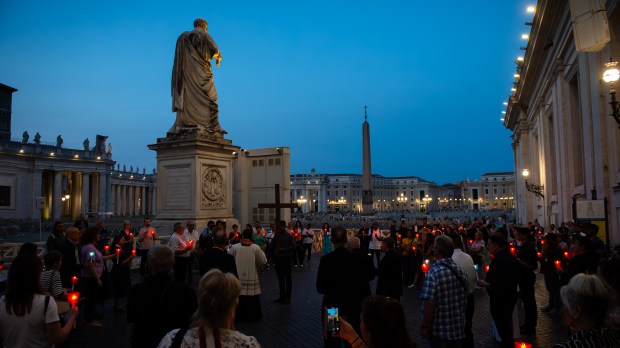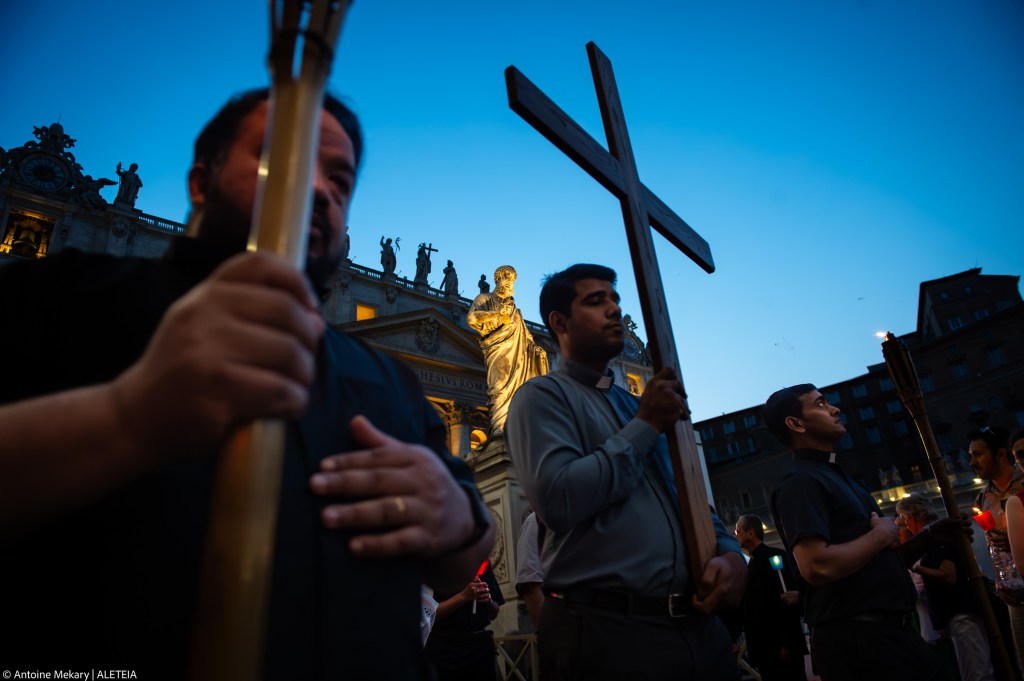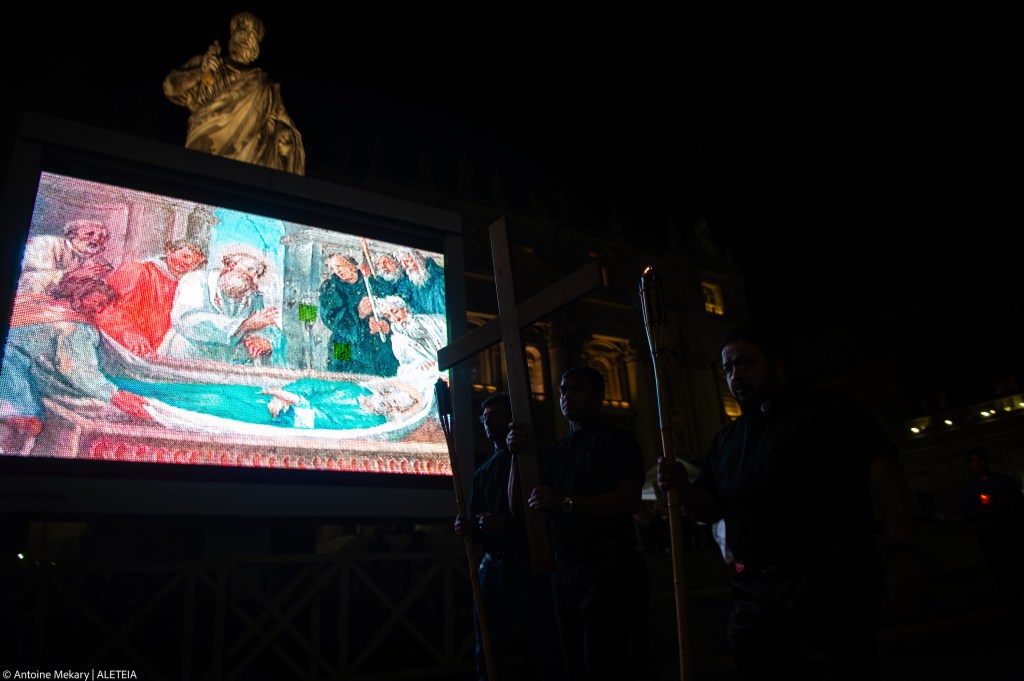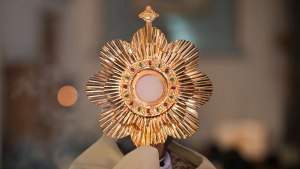The faithful have gathered at St. Peter’s Basilica in Rome to pray a new devotion dedicated to the first pope, whose relics lie below the basilica: It’s called the Via Petri, or the Stations of Peter.
This devotion, done with a candlelit procession, featuring 12 stations recounting the life of the Apostle Peter, was celebrated on St. Peter’s Square for the first timeon Saturday, June 17, 2023, and will be done again on June 24.
Aleteia gives you a sneak peek!
“We tried to take St. Peter out of the Basilica and into the Square, which is pointing to the world. We wanted to start again from the figure of Peter,” said Franciscan Father Agnello Stoia, the pastor of St. Peter’s Basilica and one of the contributors to the creation of the prayer.
In the weeks leading up to St. Peter’s feast day, celebrated along with St. Paul on June 29, the Basilica has organized several events to celebrate the first pope, including a novena and prayer vigil. Father Stoia explained that the idea for these events began in October 2022, when the Basilica projected every night for two weeks an 8-minute video recounting the life of St. Peter onto the church’s façade.
Since then it has just been about “shifting from an intuition to structuring,” Father Stoia explained. The texts were created and curated by the Chapter of St. Peter, which is a group of priests who help in the liturgical functions of the Basilica. The Diocese of Rome also contributed to the creation and organization of these events.
“We put together all our forces to present this prayer, which is simple in structure but has a strong and beautiful work behind it.” Father Stoia said. “We hope it is a prayer that can spread to parishes that have St. Peter as their patron saint or groups that look to St. Peter as as their patron.”
It can also be a devotion to pray for the figure of the pope, especially on June 29 each year.
Here are the different stations with a glimpse of the meditations!
1Jesus meets Peter
“Do not be afraid; from now on you will be catching men!” (Gospel reading : Luke 5, 1-11)
“Peter’s Christian life began on a specific day, when by the lake the voice of Jesus took him by surprise,” the meditation explains. Peter accepts to trust a stranger and “from a fisherman of fish” he becomes “a fisherman of men.” “Our Christian life also began on a specific day, that of our baptism. […] Peter’s example urges us, too, to let go of everything that prevents us from practicing the Gospel of Jesus Christ,” the meditation says.
2Peter’s doubt and fear
“O you of little faith, why did you doubt?” (Gospel reading: Matthew 14, 23-33)
In this section of the Gospel, Peter is scared of Jesus’ appearance in the middle of a stormy sea and thus he “does not trust and therefore he challenges his Master, puts him to the test,” the meditation explains. “When the boat of our life is at the mercy of the storm, our faith can also be shaken by it, to the point of tempting God, of asking Him to give us signs of His power,” the text continues. When Peter starts sinking in the sea he calls to God for help and Jesus helps him, while also scolding him for having little faith. “This reprimand is a gesture of love in view of the mission he wants to entrust to him,” the meditation explains. “The Lord is near and present. It is up to us to know how to recognize it.”
3Peter’s profession of faith
“You are the Messiah, the Son of the living God. […] You are Peter.” (Gospel reading : Matthew 16, 16-18)
The meditation on this Gospel encourages us to ask ourselves, who is Christ for us? “No one should give Christ hearsay answers, no one should settle for the words of others. You with your heart, your strength, your experience, your sin, what do you say about Jesus?” On the fact that Jesus chooses Peter to be “the rock, upon which the new Israel will be built,” the meditation highlights that “Peter is the foundation of the Church,[…], he is the point around which communion and the unity of the community is created.”
4Peter lets himself be loved until the end
“Master, then not only my feet, but my hands and head as well.” (Gospel reading: John 13, 1-11)
Before Peter’s dismay at the fact that his Master decided to wash his feet, Christ shows that “there are no roles that give privileges to those who follow Christ. The true and highest privilege is to be able to love one’s brother with the Heart of Christ and serve him with the same dedication one would use for God.”
5Peter’s betrayal and his cry
“The Lord turned and looked at Peter; and Peter remembered […] He went out and began to weep bitterly.” (Gospel reading: Luke 22, 61-62)
“Peter, the brave one, the rock, followed [Jesus] from afar and did not want to be recognized. […] Three times he says he does not know Jesus,” the meditation recounts. After his denial, “Peter comes out and weeps bitterly: It is the cry of rebirth! Tears of sorrow and of love of one who has understood the gravity of his sin and the greatness of Jesus’ love for him.”
6Peter and the beloved disciple at the tomb
“They both ran, but the other disciple ran faster than Peter and arrived at the tomb first.” (Gospel reading: John 20, 1-9)
The meditation remembers that Peter and the other disciple go as partners to the sepulcher, as the law required the presence of at least two people to attest to any fact. “The journey of faith is not done in a solitary way. This attitude of Peter, who lets himself be accompanied to the tomb, inspires the synodality of the Church, God’s family, in which we “advance together.” The synodal Church walks in communion and collaboration toward Christ, savior of all.
7Peter meets the risen one
“Do you love me? Tend my sheep. Follow me.” (Gospel reading: John 21, 16-19)
“Following Christ can be a bumpy road between leaps and uncertainties, doubts and consensus. Peter has experienced it, but the knowledge of the Master has matured and opened his eyes on the mystery of Easter that makes the passage from death to life. Peter responds to love with love, confessing his love to Jesus three times, as three times he had denied him,” the meditation says.
8Peter heals the cripple at the beautiful gate of the temple
“I have neither silver nor gold” (Reading: Acts of the Apostles 3, 1-10)
This meditation comments on Peter curing a crippled beggar at the entrance of the temple. “Eyes must see: the eyes of the Church must be open to the pain of history; the eyes of humanity must look at the eyes of God through the gaze of the Church. […] The only treasure the Church possesses is the name of Jesus, who is its saving power.”
9Peter contemplates the spirit descending on the nations
“In truth, I see that God shows no partiality” (Reading: Acts of the Apostles 3, 34-45)
The meditation explains how Peter’s last speech is an announcement of Jesus, especially directed at pagans and those who did not believe. “The time has now begun to bring the message of God’s universal love to everyone, regardless of language or culture,” the text explains. “Peter is a witness to all this. He himself experienced it: guided, converted and transformed by the Spirit, he overcomes prejudices, drops resistance, becomes able to welcome and be welcomed by those who were once considered ‘unclean.’”
10Peter freed from prison and from Herod
“Prayer by the church was fervently being made to God on his behalf.” (Reading: Acts of the Apostles 12, 5-11)
“The prayer that rises from believers to Heaven is stronger than fear. And the feeble flame of prayer becomes dazzling light in the gloomy prison. And once again the darkness becomes the frame of light, for God manifests Himself there where pain and helplessness, man’s vulnerability, dwell. In that light the chains are broken, the gates are opened, freedom is restored,” the meditation explains regarding St. Peter’s imprisonment.
11Peter is crucified
“God opposes the proud but bestows favor on the humble.” (Reading: First Letter of Peter 5, 1-11)
“It is only at this moment that Peter is able to understand that ‘Follow me’ that the Master asked him several times. Following Jesus means trusting Him and allowing Him to lead in all situations of life. […] Peter’s blood poured out is the greatest testimony of love that the fisherman from Galilee gives to the Lord,” the meditation says.
12Peter is laid to rest on the Vatican hill
“If a grain of wheat falls to the ground and dies, it produces much fruit.” (Gospel reading: John 12, 23-26)
“When death comes, it brings with it a great silence. The stunned silence of men before that which ends. Death always seems like a great defeat. Because the heart does not resign itself to death,” the meditation explains. However, the text highlights how Peter witnessed the life of “someone stronger than death. One capable of taking a finite, now-dead life by the hand and raising it up anew.” This led to him living his own death with “great hope in his heart,” which remains for us an example, a “small grain” that can bear much fruit.




